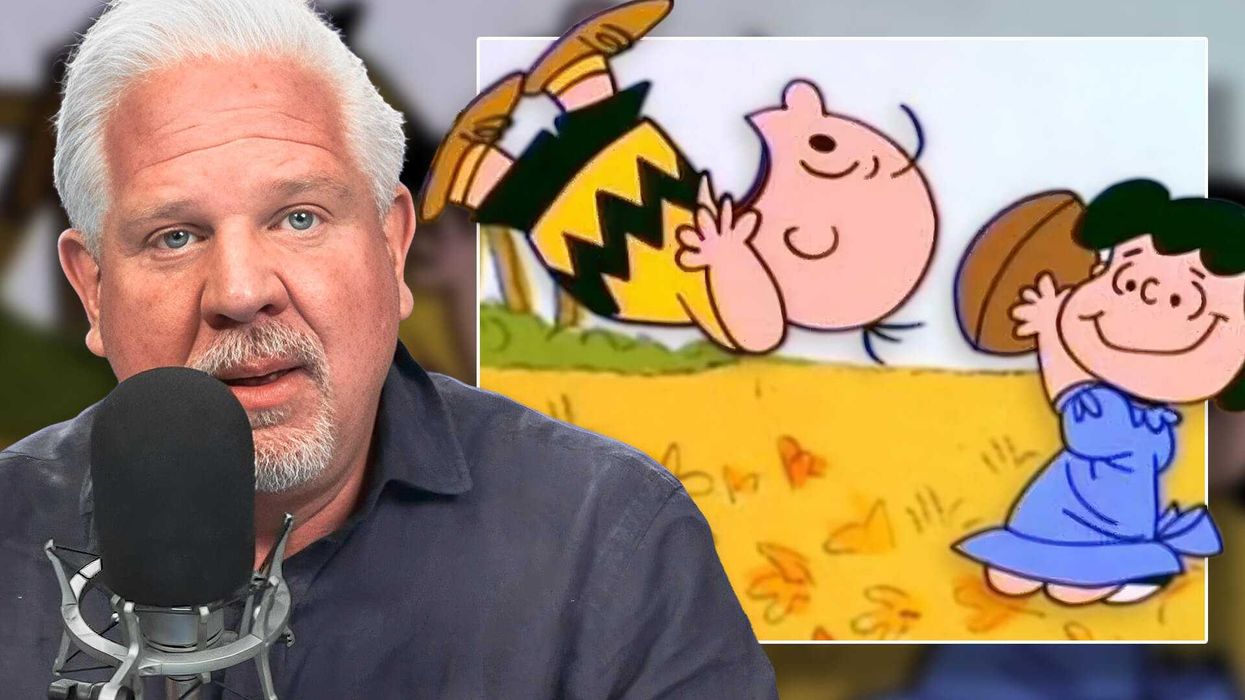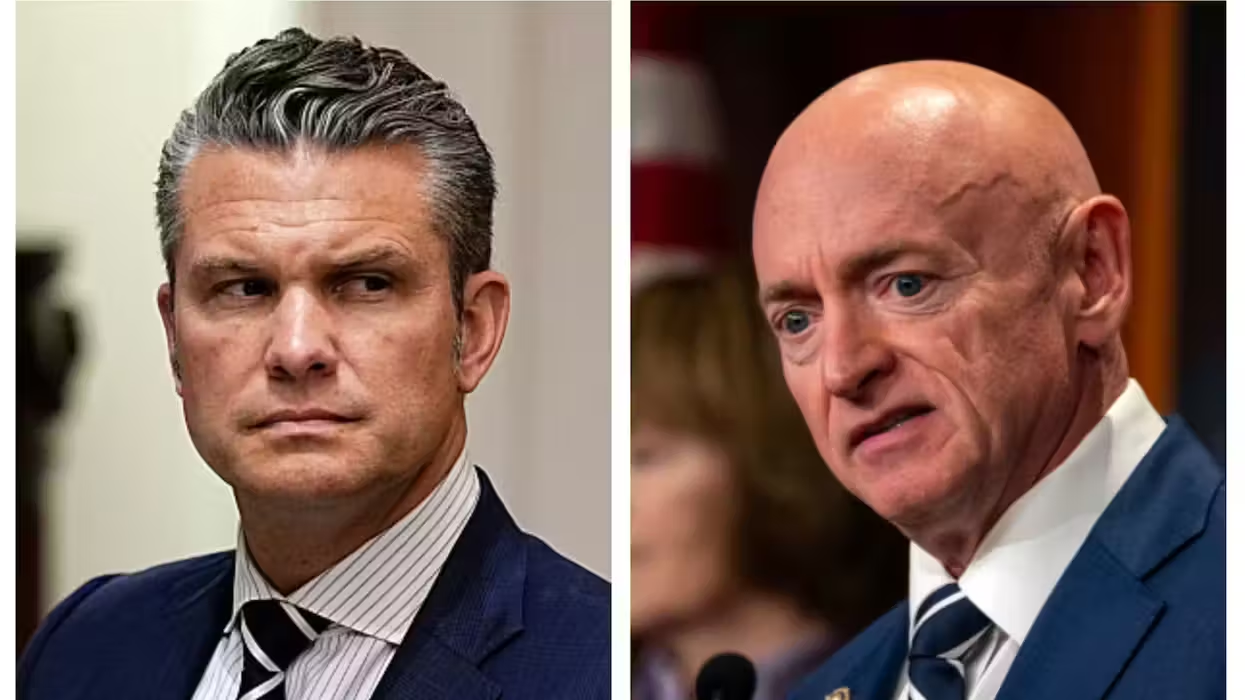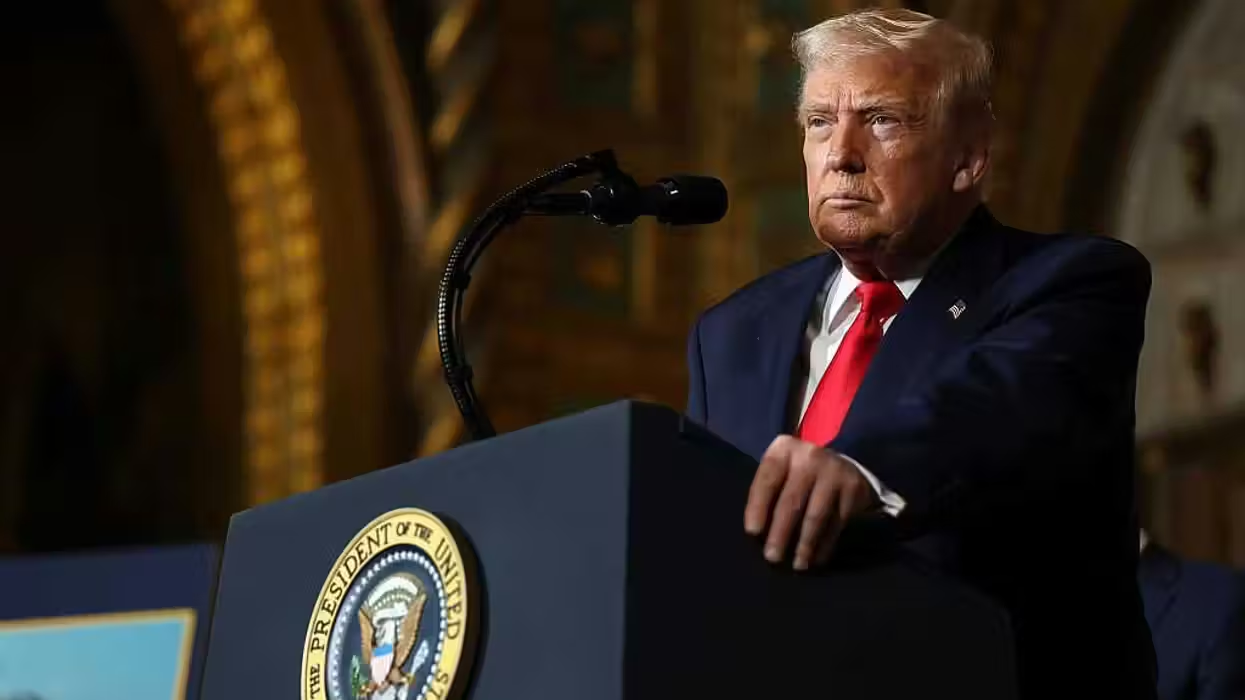
© 2026 Blaze Media LLC. All rights reserved.
An explosive interview with ex Secret Service agent Dan Bongino, author of 'Life Inside the Bubble
December 03, 2013
Dan Bongino on Obama's authoritarian leanings, Benghazi, and everything in-between.

In a hard-hitting interview with Blaze Books in connection with his newest title, Life Inside the Bubble, outspoken former Secret Service Agent Dan Bongino provided his insights on a wide array of topics, from his life in law enforcement protecting a Senator and two Presidents, to Barack Obama's worldview, the government shutdown, the Benghazi and NSA scandals and all things in-between. Below is our interview, which was conducted via phone prior to the release of his book. The interview has been transcribed and edited for clarity.
What inspired you to write Life Inside the Bubble?
[sharequote align="left"]You know action changes the world. Talk is cheap if it doesn’t motivate action.[/sharequote]
Bongino: You know I hate to use the term because as you probably know the political consultant class has all kinds of bad advice for you, but they always say to never talk about frustration or, you know anger. But, I don’t think those are necessarily negative things if you use them for the right reasons. I mean anyone can turn anger or frustration into a negative action, but I was really frustrated and frankly angry at the process, and having been an ideological libertarian, small government conservative my whole life I had this frustration being behind the scenes watching what was going on and seeing what seemed to me at the time like an irreversible trend towards governing principles which – there’s no serious person left that actually believes these governing principles work. You know redistribution, top down bureaucracy, planning based, governing based on what Thomas Sowell calls the vision of the anointed ones, the bureaucrats, and it was frustrating. So I figured if I gave my behind the scenes perspective having seen it, been enmeshed in it for 12 years that it would be, that Siren sound that sometimes people need to motivate them to action. You know action changes the world. Talk is cheap if it doesn’t motivate action.
Why should the man on the street buy your book?
[sharequote align="right"]You’ve been sold out.[/sharequote]
Bongino: Because it’s worse than you know. The government, the administrative state, the bureaucracy, you tell me a problem, you think you see with government from a libertarian or limited government conservative’s perspective and I can tell you in the book, which I give some examples on how it’s worse than you actually know it to be. You’ve been sold out. But sometimes you need an example to literally hit you in the gut to say, you know it’s kind of like…hearing about how bad a baseball team is, and then watching a game where they get blown out like 25-1, and you go “wow, they’re really bad, we need to fix something.” That’s why you need to buy the book.
What is the one thing that you hope readers take away from the book?
[sharequote align="center"]However bad you think it is, it’s worse, and it’s on a bipartisan trajectory getting worse[/sharequote]
Bongino: However bad you think it is, it’s worse, and it’s on a bipartisan trajectory getting worse by the day. People think since 2010 we’ve turned it around…we haven’t, we’ve turned nothing around, it’s still getting worse. But you really need to see the examples in the book to punch you in the gut. You need to watch or see the baseball game sometimes to realize just how bad the team really is.
What is the one thing that people on the outside do not appreciate about the job of a Secret Service agent?
Bongino: It is a cerebral exercise. It is not, contrary to Line of Fire or whatever movies or tv shows you may have seen or comic books. It’s not a bodyguard job. It’s not. Ironically, 99% of what you would call bodyguard work or physical security as it’s called in the business is actually done by uniform law enforcement, not us. We’re the ones that design the plan, and the plan is a cerebral exercise that takes literally decades, I kid you not, decades to master. Think about it here. I call it the big six: tactical, medical, chem-bio, IED, airborne and fire, and maybe sometimes geologic. You have to have an A to Z plan to mitigate every one of those threats: a tactical threat, a medical threat, a chem-bio threat, an IED, an airborne threat, a fire, and when I say geologic, sometimes earthquakes depending on where you are. But not just an A-B plan, an A-Z plan. Do you have any idea how complicated that is? With budget constraints and manpower constraints, it is really…it is a cerebral exercise that very few have truly truly mastered. And that’s why very few guys get to the President’s detail, and even after that, very few of those guys eventually even do a lead advance where they’re in charge.
Only a failure or perceived failure will ever make the news about the Secret Service. You mentioned in the book that the Obama administration has officials whose behavior was worse than those of the Secret Service agents who were part of the Colombia scandal. Care to comment on that?
[sharequote align="left"]He took an opportunity there instead of doing the right thing to do the political thing[/sharequote]
My critique of the President is, the Secret Service could not have been more harsh – they fired the guys immediately. I mean what else do you want them to do? You want a public hanging? There were no operational consequences to it, it was horrendous behavior, totally inappropriate, and they were fired as they should have been. But the President then comes out, he knows very well that this stuff happens with White House staff. He’s not stupid and I’m sure he was briefed on it before he got up there and it just kind of looked like…it kind of reminds me of a talk show host that has a theory out there that the President always removes himself from the consequences of his own bad policy. So he gets out there and instead of taking responsibility you know knowing very well that his staff was likely doing the same thing, he gets up there and “Uh this is terrible but I don’t know…and they should be punished [we] should get rid of these guys,” I thought it was totally inappropriate. I mean if he got up there and would have said “Hey, we’re doing an internal investigation and we found out that this historically has happened with us too and we’re going to clean house and it’s my responsibility…” That’s not what he said. He took an opportunity there instead of doing the right thing to do the political thing, which was to take an additional shot and really make sure that the screws were turned on these guys, but absolve his staff of any consequences whatsoever.
To that end, in your view is the Obama administration guided more by ideology or politics?
[sharequote align="center"]He is...married to redistribution as a fundamental economic theory[/sharequote]
Bongino: Oh, ideology, hands down. I hear from people all the time and it infuriates me that “President Obama’s a brilliant politician.” No he absolutely is not. Bill Clinton was a brilliant politician. If President Obama was a brilliant politician he would have come out before the election and said “Hey we’re gonna cut taxes, grow the economy, what I’m doing’s not working, and we’re gonna change course” like Clinton did. Remember “the “era of big government is over?” That’s a Clinton line, not a Bush line. But that’s not what he did, and I say that in regards to your question, he didn’t do that even though he would have won the election by 5-7 points if he had done that because he is so married to redistribution as a fundamental economic theory and this whole idea that government is a weapon not a service-oriented function – that it’s a weapon, it’s a means to enforce an end, that the politics to him are irrelevant. I mean look at Obamacare now. He still cannot apologize for this. He should apologize to America…my insurance got canceled I was one of ‘em, I put it on Facebook. I got 400,000 views on it, my letter. He still will not apologize. Why? Because he believes in government, bureaucratic, top down management of the healthcare system. End of story. The politics have nothing to do with it. He’s a terrible politician, he’s not a good politician, he’s a good speaker he’s not a good politician, there’s a difference. [Editor's note: we interviewed Bongino prior to Barack Obama's public statements regarding Obamacare rollout issues. Bongino had this to say on Obama's statements in a follow-up: "It was an apology with a caveat, which is not an apology at all. It is a backdoor way to blame the victims."]
On foreign policy, do you have a view as to why the President has embraced Islamist forces in the Middle East and specifically the Muslim brotherhood over traditional secular authoritarian leaders?
[sharequote align="center"]It’s a matter of the heavy-handed top-down authoritarianism that they both share in common[/sharequote]
Bongino: I think it has more to do…I don’t think it’s so much a function of the religion component to it as much as it is a function of…you know David Horowitz has some interesting pieces on this how the [hard] Left and Islamofascism…have a mutual interest in this authoritarian method of governance. Like there’s a mutual goal there, if that makes any sense. And I think he finds some kind of uh, again endgame in that, that they can both align on and they may be a tool for him, but I do think that’s why. I know there’s a common sense argument some will try to throw out there and say “well a lot of the secular regimes in some countries which are largely Islamic are authoritarian too” but yea not to the degree that the Brotherhood would be. There’s a clear difference there. So I think again it’s not a matter of the religion, it’s a matter of the heavy-handed top-down authoritarianism that they both share in common, and I think that’s why the default is to defend them when you know it should be to frankly to rid these countries of them.
In context of your personal experience with President Obama, and your impressions of the administration, would you care to comment on his administration’s decisions to shut down historical sites during the recent government shutdown?
[sharequote align="center"][President Obama] used your tax dollars to pay people who work for you to keep you out of your memorials.[/sharequote]
Bongino: Yea absolutely, it actually goes back to one of my points we made earlier on a separate question that they see government, him and his acolytes, and the insiders I talk about in the book, this bubble that surrounds him, that entire bubble, they see government as a weapon. You know government’s a weapon, it’s a means to enforce an end, it’s not a service industry to them. You know if it was a service industry they would have served and they would have found a way…ironically they spent more money making sure they were going to punish the American people then if they were to have left the monuments open. Now I’ll caveat this by saying if there was a…let’s say it was “the Teddy Roosevelt cliff somewhere,” and there was a park ranger there all the time saying “folks, don’t peak over the cliff, there’s a chance you may fall,” ok I get that. That would make sense. Gate it off, you don’t want anybody to fall. But that’s not what happened. The WWII memorial is an open air monument. There is zero and I mean zero consequence to leaving that open. None. They did it to enforce the fact that government is a weapon, they’ll use it as they please, they were going to punish the American people, and clearly the media played along and it worked. Which, again, infuriates me to no end. You know the narrative now is the Republicans shut down the government. I always say to people “How? How’d they do that? How? They don’t have the bodies to…how do the Republicans shut the government down?” Just tell the truth. I get it, I don’t think the shutdown was a great move either. But don’t blame the Republican party for it. They came back with three very reasonable proposals, all of them were denied, no one holds the President accountable for anything, he punishes the American people with their own tax dollars, and all of the sudden the Republicans…listen I have a lot of problems with the Republican Party as it is now. That’s why I identify myself as a libertarian conservative. But let’s at least get the story straight. The President of the United States used your tax dollars to pay people who work for you to keep you out of your memorials. I mean it’s…he doesn’t take a hit on this? It’s absurd.
How did you balance your ideological disagreement with President Obama with your own job protecting him?
[sharequote align="left"][The media] really [doesn't] understand the damage they are doing to the fabric of America[/sharequote]
Bongino: Well, it was never a problem for me because, you know my oath was to the American people. Ironically your oath is not even to the President. You know your oath is to defend the office of the presidency, which is a function of our Constitution. We’re not a banana republic. You can’t have your security people turning on you every time you don’t agree with their policy. So to me it was a total complete non-issue. You know I said to another interviewer, there were at some points where I felt an obligation to even work harder, just to prove, because the staff…most of the staff that I spoke to, it was no secret that I was a conservative, I mean you live with these people. I talked politics all the time. Matter of fact when Obamacare was being implemented I would tell the staff all the time, this was the most ridiculous piece of legislation I’ve ever seen. It can’t work. So they knew where I stood. But I almost felt an obligation on the security side, if it was even possible, because we were already working at maximum capacity, to put in even some extra effort, you know to make sure. I mean the inauguration as I write in the book, and I give a very detailed account again from how cold the pavement was to what it was like walking down that street. It was a proud day for me. It was. I mean I thought despite my legion of political differences with the President, there was nothing we could do at that point. I mean he was the President. It was a historic moment. Race…we’ve had a scarred history with race, I don’t think anyone questions that on either side of the political fence. And to watch the faces of, where hundreds of thousands of black Americans who were sitting…I mean I was there, who had lived through legal, government-enforced segregation, via Jim Crow. You know because I got in conversations with a lot of folks there, to watch them proudly, you know there were tears and applause as the President got out of the car which was a touching moment. The emotions were pure. But what frustrated me afterwards was the immediate turn by the media and everyone else, which I write about in the book, and it gets to your question about the conflict of emotions…was I was proud, there’s no question about it as an American. You know I was terrified politically, but I was proud of what happened. The immediate turn towards this narrative that because the President was black there was this massive threat level and the country wanted him dead and all these people were…that just wasn’t true. And I lay out in the book pretty clearly how it was just a totally fabricated story. And that just added to my emotion that, why’d you have to ruin what was at least as the country’s statement, a good thing. I mean millions of white Americans voted for and publicly advocated for and supported with their hearts, minds and time President Obama, and the media immediately had to turn to this story how “all these people…” they pinned it on the Tea Party and a lot of other folks, there was this racist [sentiment]…and he was definitely in trouble, and it just wasn’t true it was completely made up…[the calls of racist are] just so inauthentic and pollutes the political process to such an extent…I don’t really even think the media understands and the, you know the hacks on the other side that use race for everything and misogyny…really understand the damage they are doing to the fabric of America. I really don’t. I mean you see it from both sides, and it is really horrible having run myself to be…any time you make a statement, as I do a lot when I guest host on radio…any time you make a prescription, a policy prescription that doesn’t align with traditional heavy-handed government and someone says “Well that’s gotta be racist,” it’s just, the frustration is unbearable.
One of the major points of your book is that government bureaucracy breeds not only inefficiency but puts American lives in danger. How would you propose dealing with our massive government bureaucracies? How concerned should Americans be about their safety?
[sharequote align="center"]Bureaucracy is killing you, literally killing you.[/sharequote]
Bongino: Well they should be very concerned and if Boston wasn’t a wakeup call…I mean I say sometimes bureaucracy is killing you, literally killing you. I mean people have died as a result of bureaucratic inefficiency. Look at 9/11. They said “well the FBI and the CIA couldn’t communicate because there was a wall in-between them.” It just wasn’t true. It had just been assumed for so long that that was the case that the FBI and the CIA just assumed it was true. But it wasn’t. It was just made up. It was due to this layering of bureaucracies on top of each other that’s done for a very, very important reason. And this is what should infuriate Americans because not only is government inefficient, and is it bankrupting you, it’s actually killing you. The explosive growth in the bureaucracy has allowed people at the highest levels to make decisions based purely on politics, not on your safety. Purely on politics. Now if this was an accountable government, oriented towards service, we would be able to vote these people out, but you can’t because they’re bureaucrats, so you’re stuck with them. So in Benghazi, when four Americans die due to political decision-making, not security decision-making, that cost four American patriots their lives, Mrs. Clinton can get up there and say “What difference does it make?” And as I quote in the book emails and statements from her and her staff that clearly say “oh yea, it all got lost in the bureaucracy,” and every American just accepts it. America just accepts it “Oh yea the bureaucracy is big.” You think we should fix it? Think about that in a private company in context. If Apple kept producing phones that didn’t work, electrocuted people…malfunctioned in the worst possible way, and the management of Apple kept saying “Listen, we’re a big company, it’s just the bureaucracy,” the stockholders would bail out tomorrow morning. But in government it’s just…government has grown so big and you’ve become so inoculated to the fact that it has to be big that when anything goes wrong you blame it on the bureaucracy it’s like “Oh yea, that makes sense, yea it’s the bureaucracy” and what I’m very careful to do with Boston, Benghazi and Fast and Furious is give you hard, pinpoint examples of how exactly the so-called bureaucracy is blamed for decisions that could have been made by people that unquestionably would have saved lives. There’s no question about it.
How much of what is at issue is the politics of the bureaucracies versus the ideology that motivates the bureaucrats (i.e. political correctness taking precedence over getting things right)?
[sharequote align="center"]I mean look at the GSA scandal...Your money's still going down a rathole[/sharequote]
Bongino: It’s more a function of the ideology of big government feeding into an incentive-based system. In other words liberals and phony Republicans who keep expanding the bureaucracy, but at the lower level, incentives to keep quiet and not do anything. So in other words when you’re, let’s say you’re in the Secret Service, and you’re in the training center, where I was, and you get a budget. You know every manager in there gets a budget, but if you don’t spend the money by the end of the year, they’ll tell you to spend it. “Yea but we don’t need it.” “Yea but waste it, go buy something because we won’t get it back next year.” So the incentive at the low end is just to do what you’re told and not say anything. And then whistleblowers are forced into a system where they’ll have an ombudsman or something, and the ombudsman is usually a friend to everyone else within the agency, so of course if you have a problem you need to have fixed, and you bring it up, of course it’s gonna get out there that “he’s a troublemaker.” And the great irony is, they try to pollute the Secret Service code, some in management. You know the code is obviously keep quiet about the protectees, which you should (I reveal nothing about personal behaviors in the book). But the irony is that I’ve already had a couple management people allude to this. I’ve heard through the grape vine that folks say “Well, he [Dan Bongino] shouldn’t say anything about the problems, we keep that in house.” “OK well you don’t fix it in house.” And the Secret Service is just a microcosm of the larger government problem. Nothing gets fixed. Ever. I mean look at the GSA scandal. I guarantee you they have the exact same problems now they had before. Your money’s still going down a rathole. The Secret Service they move the people around the country for no good reason, other than they used to do it. And all the people who get moved complain about it: “Why are we getting moved?” And these are the same people who say “Well, why would you write a book about the Secret Service’s problems?” You know why? Because the Secret Service’s problems are the government’s problems. And if something doesn’t change soon there’s not going to be a government.
You discuss at some length in your book your ideological evolution as someone advancing in national security while studying Austrian economics and libertarianism more generally. How do you reconcile your libertarian views with your beliefs on defense and national security?
[sharequote align="center"]No good libertarian I know wants us to completely isolate ourselves from the rest of the world[/sharequote]
Bongino: Well libertarianism ironically is a national security platform. It’s just the brand has been polluted so much–the Republican brand that is–that some associate libertarianism with isolationism. No good libertarian I know wants us to completely isolate ourselves from the rest of the world. It’s not even possible. I mean there are economic ties – there are trade routes that need to be secured. You know international trade can’t happen if you don’t have open oceans. I mean no one is saying that on the libertarian side. But I bring up the fact that libertarianism is a strong national security policy because I’m just telling you what common sense is telling you just by looking at the analysis. I mean, look at what took down, ultimately is going to take down Vietnam. We’ll see where it’s going now. Free markets. You know I lost my uncle there, and it made no tangible difference. You know we’re in Iraq, we pulled out of Iraq. Now Iraq is melting down. The Wall Street Journal had a report [on it recently]. You know bombing, suicide bombings are up the minute we walked out of there. We could have stayed there ten more years, it wouldn’t have mattered. You know Afghanistan, I spent time in Afghanistan. I got news for you: the only people who understand Afghanistan is us. You drive around some of the areas in Afghanistan, the loyalties are to the tribal leaders. They don’t even know what Afghanistan is, it doesn’t mean anything to them as a country. So we’re forfeiting away treasure and blood, wearing out our military, families are losing their sons and daughters for a security policy that’s not making us more secure, making us less secure. So I would argue libertarianism and the general principle that if there is not a direct impact—direct—not third or fourth times, three or four times removed, a direct impact in U.S. national security, we should not be there. The world should be responsible for policing its own problems. That is a national security policy. The brand’s been polluted so much though again by some on the other side that they’ll tell you with their bow-tie on and their PhD in foreign affairs that we’re all crazy.
What does every American absolutely need to know about the failures surrounding Benghazi and should Americans expect more Benghazis in the future?
[sharequote align="center"]“Those guys were left to die.”[/sharequote]
Bongino: Yea, well here it is in the subject line of an e-mail. "Those guys were left to die.” There is no question about it. The only question is why. There is no question they were left to die. I make the argument in the book that it was strictly a political decision. They can argue all they want “The assets weren’t there…” It’s a short chapter, it’s not meant to be…the purpose of those three chapters was to present a “Reader’s Digest” version, like a court case that if you were a judge, here’s why this is wrong. And sometimes the length…that’s why I kept them short. I wanted you to leave that with that idea in that chapter. Those guys were left to die, and here’s why. And yes, you will hear more in the future about this. Pandora’s box isn’t open, it was just cracked a little bit [by 60 Minutes]. [Editor's note: this interview was conducted prior to subsequent revelations about 60 Minutes' Benghazi report]
I do think that there will be attacks abroad just based on the threat environment. Will the politics of security make the likelihood of an attack worse? Yes. If they don’t…if there’s not an adequate…if someone isn’t held responsible for this and the perception out there is that you can let our people die overseas for a quick political gain, and everyone will cover for you, including some in the media (remember they called this a “Fox News story” when it first started)…if that’s the perception then, yes the likelihood of a future attack will grow exponentially. There’s no question about it.
What’s your perspective on the NSA scandal? How do you view the balance between liberty and security?
[sharequote align="right"]The NSA scandal is a debacle and scandal is an inadequate word[/sharequote]
Bongino: Well that’s always a red herring argument. They always want the liberty versus security argument because it creates a Hobson’s choice. There’s not really a choice at all. So I gotta give up my liberty or my security? How’s that a choice? Because remember, one, the NSA scandal is a debacle and scandal is an inadequate word because this should be public enemy number one right now, scandal-wise, out of all of the scandals I have to say for the American public. Because what makes us different—what’s always made us different—and I speak about this topic frequently—in the United States rather than in totalitarian in regimes, is the fact that the public and private self here are different. You know in totalitarian regimes everything is public. Neighbors are encouraged to rat on their neighbors and get people killed and put in jail. There’s just no private self. Everything’s public. What makes us different is the fact you have individual liberty. You can determine where that line is between the public and the private self. When you hit your garage door opener in the morning, get in your car and leave, you understand you’re going to behave and act differently because the private you is over and the public you has begun. What the NSA scandal did, and what happens in totalitarian regimes is that line is wiped out. Things you now thought were private and had assumed the whole time—emails--everybody assumed they were private--are now not private. They are now in the public arena. Now they may not be publicly disclosed yet but that’s very different than saying…but they are out there in the public arena…they’ll be disclosed when the NSA chooses to, and when they need to leverage that information. So that’s a devastating scandal and there is no liberty versus security argument without making real changes to enhance our security, which I recommend in the book. They could have quite simply broken down the incredible number of walls and silos between all these federal agencies, consolidated and reallocated manpower based on the threats. They did none of that. Their default mechanism was, let’s not do anything that actually works. Let’s just collect on every single American, every email and phone number they dial, but let’s ignore any real changes. And people scoop it up. You know even some Republicans. They want to be safe? Well we’re not safe. We’re not safe because you’re not doing anything to fix it.
Given your prior challenge to Senator Ben Cardin having never held office previously, what would you say to political activists who are thinking about jumping into the fray against entrenched politicians?
[sharequote align="center"]Believe me I had as many fights with Republicans as I did with Democrats. [/sharequote]
Bongino: Well my story in the Senate campaign pretty much blows away the traditional narrative that it takes political connections and all kinds of wealthy backers to run a credible campaign. I had no one. I had two donors when I started, me and my father. That was it. So the lesson is, if you’re committed to it and I mean committed, it’s not a full-time job, it’s two full-time jobs, to run for office. If you’re committed to it and you feel that you’ve done the homework because remember just because you can run doesn’t mean you should. I mean if you are committed to it, if you’ve done the homework, you’ve been digging into National Review and the Wall Street Journal and reading about economic theory and the law, and you are absolutely committed to it, don’t let anybody and I mean anybody tell you not to. Because the entrenched interests on both sides—believe me I had as many fights with Republicans as I did with Democrats. If I was told one more time that I needed to wait in line, I was gonna erupt. I was so angry. And that was by Republicans. So don’t wait in line. There is no line. The only line that matters is the one at the voting booth. Now granted, we lost. But we lost under a very specific set of circumstances. We were actually doing quite well, and had gotten within striking distance of our opponent right up until the third-party candidate jumped in at the end, and that’s a whole other story, and I think I describe that in the book. But to win the Republican nomination over nine other candidates with no political office, no donors, and no organization, but building it with a passion and a fire…I would say don’t ever be talked out of it, and go for it if that’s in your heart.
Lastly, how is your current campaign for the House going?
Bongino: Terrific. And I know there’s always a degree of hyperbole any time any candidate talks about it. But I can tell you factually just based on hard metrics we are in great shape. We’re raising a whole boatload of money: 90+% of it grassroots. The volunteer organization—we made a lot of mistakes last time which we learned from. We’ve got really passionate people involved and I’m very confident we’re going to be be raising our right hand and sworn in on January of 2015.
Want to leave a tip?
We answer to you. Help keep our content free of advertisers and big tech censorship by leaving a tip today.
Want to join the conversation?
Already a subscriber?
Ben Weingarten is a writer, commentator, and editor at large at RealClearInvestigations. He is a senior contributor at the Federalist and writes columns for Newsweek and the Epoch Times.
Ben Weingarten
Ben Weingarten is a writer, commentator, and editor at large at RealClearInvestigations. He is a senior contributor at the Federalist and writes columns for Newsweek and the Epoch Times.
more stories
Sign up for the Blaze newsletter
By signing up, you agree to our Privacy Policy and Terms of Use, and agree to receive content that may sometimes include advertisements. You may opt out at any time.
Related Content
© 2026 Blaze Media LLC. All rights reserved.
Get the stories that matter most delivered directly to your inbox.
By signing up, you agree to our Privacy Policy and Terms of Use, and agree to receive content that may sometimes include advertisements. You may opt out at any time.






